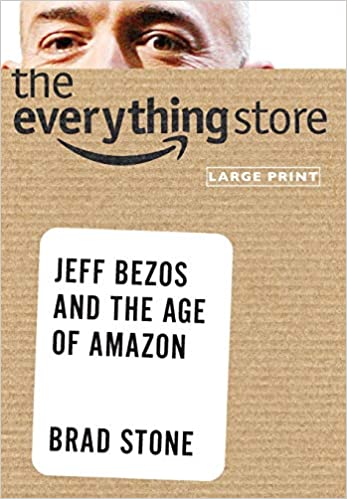
Notes on
The Everything Store
by Brad Stone
• 4 min read
The book starts out by tells the story of another book. That book is an investigation into the gifted education in Texas. It has a boy named Tim in it, and Tim was exceptionally bright.
Tim was not, however, the boy’s real name; it was Jeff Bezos.
I won’t tell the story of Amazon; that’s what this book does. And it does it well. But Bezos himself actually believed it was too early for a book such as this to be written about Amazon.
I could tell you that there’s a thing such as getting ‘Amazoned’, which means to watch helplessly as Amazon takes your customers and profits of your small business.
Or how about how Amazon started as a book seller and then ventured into other things. About how Amazon then went on to overcome the dot-com bubble. Then they started selling even more things. Later expanded to what is now AWS. And they also made the Kindle.
Maybe you want to hear more about Jeff Bezos?
- Bezos is supposedly indifferent to the opinions of others. He’s also a great problem solver with an overview of everything.
- Bezos is supposedly also very hard to work for. He throws the same fits as Jobs, and holds everyone to his own rigorous standards. He’s a micromanager with plenty ideas.
- Bezos supposedly also casts a reality-distortion field. Like Jobs.
- Bezos is supposedly an amazing communicator within Amazon, but he rarely gives interviews or speeches outside.
- Bezos started Amazon at 31.
- Supposedly, Jeff has wanted to go to space for a long time. So maybe it isn’t just a hobby to compete with Musk.
Or you want to hear about what makes Amazon different?
- Amazon does not use PowerPoint slides, they instead require employees to write 6-page narratives, which leads to better thinking through writing.
- Bezos on why Amazon is different.
- They are genuinely customer-centric,
- They are genuinely long-term oriented, and
- They genuinely like to invest.
- The six core values of Amazon.
- Customer obsession,
- Frugality,
- Bias for action,
- Ownership,
- A high bar for talent, and
- Innovation.
- Amazon optimized their fulfillment centers using Six Sigma and lean manufacturing.
- Amazon used principles from The Goal by Goldratt to better their fulfillment centers.
- Amazon eliminated any layers of middle management because they aren’t necessary - you want doers, not managers.
- Amazon used principles from Good to Great to guide when they should acquire other companies
Or maybe some of the other interesting things I stumbled upon as I read the book?
- The Narrative Fallacy; we tend to group complex mechanisms and oversimplify them to make sense of the world.
- The regret-minimization framework was created by Bezos, which he used to decide whether he’d stop at D.E. Shaw & Co and create Amazon, or if he should continue working there. With this framework, you attempt to minimize regret later in life by actively taking choices that may lead to less regret.
- Bezos made a corollary to Deal flow called Women flow, which he tried to improve by taking dance classes. A ‘fun fact’, but I found the concept of deal flow fascinating.
- A fantastic few points taken from the Sam Walton autobiography, which Bezos embraces within Amazon.
- Develop a bias for action.
- Frugality is important.
- Can another Walmart happen? Sure, according to Sam Walton, but it’ll take effort.
- Network effects; where products or services become more valuable as more people use them. Like social media platforms.
- The motto for Blue Origin is Gradatim Ferociter, which means “Step by Step, Ferociously.”
- Check if what you are considering on doing is a core competency, or a commodity when deciding on what you should do in business.
- You can’t make a good decision about a product or feature without knowing how it would be communicated to the customers
Quotes
When you are eighty years old, and in a quiet moment of reflection narrating for only yourself the most personal version of your life story, the telling that will be most compact and meaningful will be the series of choices you have made. In the end, we are our choices.
— Jeff Bezos
Slow steady progress can erode any challenge over time.
— Jeff Bezos
Jeff Bezos’ Reading List
- The Remains of the Day, by Kazuo Ishiguro
- Sam Walton: Made in America, by Sam Walton
- Memos from the Chairman, by Alan Greenberg
- The Mythical Man-Month, by Frederick P. Brooks Jr.
- Built to Last: Successful Habits of Visionary Companies, by Jim Collins and Jerry I. Porras
- Good to Great: Why Some Companies Make the Leap… and Others Don’t, by Jim Collins
- Creation: Life and How to Make It, by Steve Grand
- The Innovator’s Dilemma: The Revolutionary Book That Will Change the Way You Do Business, by Clayton M. Christensen
- The Goal: A Process of Ongoing Improvement, by Eliyahu M. Goldratt and Jeff Cox
- Lean Thinking: Banish Waste and Create Wealth in Your Corporation, by James P. Womack and Daniel T. Jones
- Data-Driven Marketing: The 15 Metrics Everyone in Marketing Should Know, by Mark Jeffery
- The Black Swan: The Impact of the Highly Improbable, by Nassim Nicholas Taleb
Liked these notes? Join the newsletter.
Get notified whenever I post new notes.